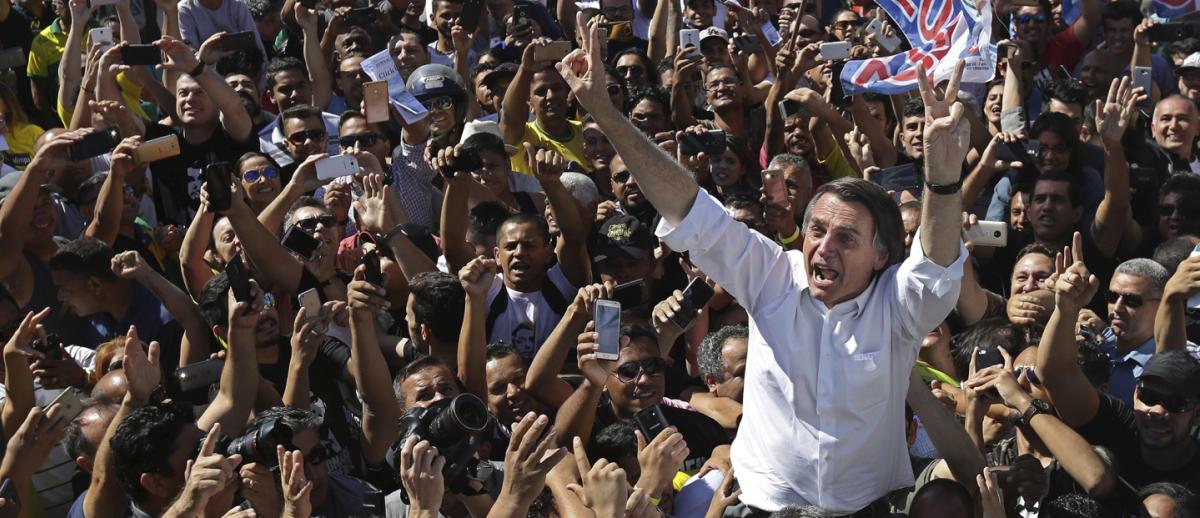International Implications of Brazil’s 2018 Elections
archive


Brazilian Presidential candidate Jair Bolsonaro during 2018 election rally (photo: AP)
International Implications of Brazil’s 2018 Elections
For the first time in Brazil’s recent history, the people have chosen as their leader a populist, extreme right-wing politician, who expresses nostalgia for the former military regime and praises its most regrettable features and symbols. How was this predictable yet astonishing development possible? How long will it last? What will be its impact on a society marked by blatant social injustice? These are questions that we are not yet able to answer in any satisfactory way. Was antipetismo—the aversion of large sectors of the population towards the Workers’ Party (the PT for short), which admittedly made mistakes and adopted practices it had criticized in other governments—the main cause of the debacle of the center-left and even right-of-center political forces? Or was the anti-system sentiment of people suffering from such evils as record unemployment and rampant urban violence the predominant factor behind the election of a candidate whose main economic adviser is, paradoxically, committed to ultra-neoliberal policies?
We know from several sources, including observations made by the OAS electoral mission, that the exponential use of internet media (mainly WhatsApp) spreading abundant fake news had a significant impact at the polls. But one must also admit that these irrational verbal and graphic bombshells fell on fertile ground. It will take a great deal of analytical effort to identify what lies behind the inclination of a large portion of the electorate to accept them as indisputable truths. Among the stories that were spread was one about the PT presidential candidate, who supposedly promoted a so-called “gay kit” (a kind of manual or method to encourage homosexuality in school children) and another one about the existence of a leftwing conspiracy to create a Union of the Latin American Socialist Republics (URSAL, in its fancy Portuguese acronym). Such fantasies were sold to a surprisingly receptive and gullible public.
One might be tempted to think that, once the elections were over and victory assured, attitudes and declarations would become more rational and realistic. However, so far this has not been the case. Threats against persons and social movements continue to be made, albeit in a somewhat disguised way. The aggressive rhetoric used during the campaign has also worked as an encouragement for far-right groups, especially in universities. And the bad image projected abroad as a result of successive parliamentary and judicial decisions since the impeachment of Dilma Rousseff and the imprisonment of former President Lula da Silva (including the subsequent disregard of the UN Human Rights Committee interim measure concerning his right to stand as a candidate) is falsely and conveniently attributed to the manipulation of world opinion by the PT.
In foreign policy, open criticism of Mercosur (“not a priority”), disparaging comments about international organizations, the proclaimed intention to follow Donald Trump’s path in relation to the Convention on Climate Change and to moving the Brazilian embassy from Tel-Aviv to Jerusalem are coupled with aggressive language towards Venezuela as well as anti-Chinese remarks. All this points to total alignment with Washington’s present policies, precisely at a moment in which Europe and a great number of countries are pondering how to respond to the United States’ inclination towards unilateralism. Add to this the absolute disregard for Africa, in a country which has the largest population of African descent (second only to Nigeria), the lack of priority to South-South cooperation, plus the total absence of attention to important changes in the structure of world order (including the rising role of BRICS countries, of which Brazil is a constituent member) and one gets a broad picture of the diplomacy that is being projected for the next few years.
This blind subservience to a narrow vision of international affairs will produce a caricature version of Trumpism, supposing this is possible. Aside from any critique of Donald Trump’s policies, such mimesis does not fit well with Brazil’s own diplomatic tradition. Nor is it based on facts. For one thing, Brazil possesses neither a nuclear arsenal that might allow it to ignore the importance of international norms as a limit on the use of force, nor other forms of coercion. For another, Brazil’s economic relations with the rest of the world (unlike much of Latin America) are very diversified. This attitude of “strategic subordination,” already perceptible in the outgoing government and which is now taken to at least rhetorical extremes, is raising eyebrows even among conservative Brazilian politicians and journalists who, all-of-a sudden, are showing concern about its potentially disastrous effects on trade and, more generally, on Brazil’s long-time respect for dialogue and peaceful solutions of disputes.
Historical examples point to another source of concern. In the past, extreme right-wing governments that were unable to solve social and economic problems resorted to international conflict, sometimes to war, in order to distract public attention from the sufferings caused by unemployment, inflation, and inequality, which in Brazil have a marked gender and racial component. One can only hope that a century and a half of peace with our neighbors and the intense cooperation of the last few decades will not be interrupted by some impulse to promote “regime change” in the region. This will depend a lot on the attitude of Washington, especially vis-à-vis Venezuela. Although some of the president-elect’s advisors (especially in the military) reaffirmed the intention to abide by the constitutional principle of non-intervention, demands by high-ranking US officials that Brazil should “play tougher” with Caracas—made even before the election process began—coupled with a policy of total alignment, justify some degree of worry.
...blind subservience to a narrow vision of international affairs will produce a caricature version of Trumpism, supposing this is possible.
Brazil has a strategic partnership with the European Union that was established in 2007 during the government of former President Lula da Silva. Economic considerations certainly weighed on Brussels’ and the EU members’ minds when proposing this initiative. But the association between Brazil and the EU (either directly or through Mercosur) always had a political as well as an economic pivot. Beyond important considerations on subjects such as human rights and the environment, our European friends will have to carefully consider the role that this new populist and rightist Brazil will play in the world.
For many people—and not only for supporters of the Workers’ Party—the choice posed by the second round of Brazil’s presidential election was not so much between right and left, but between civilization and barbarism, and at least for now, barbarism was the victor. Is it possible to moderate the impulses of the newly elected government or mitigate its worst consequences? And, if so, how to proceed and what role should Brazil’s international partners play? What is the best way to positively influence the political life of such a huge country, without meddling in its internal affairs? Such considerations should be on the minds of decision makers around the world as Brazil moves from policies that supported integration in Latin America, cooperation among developing countries, and multipolarity within the framework of international norms into an uncharted terrain in which echoes of “America First” will be heard, albeit with adaptations and dissonances.



